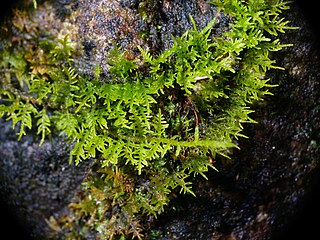
Funaria is a genus of approximately 210 species of moss. Funaria hygrometrica is the most common species. Funaria hygrometrica is called “cord moss” because of the twisted seta which is very hygroscopic and untwists when moist. The name is derived from the Latin word “funis”, meaning "a rope". In funaria root like structures called rhizoids are present.
Lepidopilum is a genus of moss in family Pilotrichaceae. There are over 200 species in the genus.
Neckeropsis is a genus of plant in the family Neckeraceae.

Pogonatum is a genus of mosses — commonly called spike moss — which contains approximately 70 species that cover a cosmopolitan distribution. It can be seen mostly in Asian countries with a tropical climate.

Ditrichum is a genus of haplolepideous mosses (Dicranidae) in the family Ditrichaceae.

The Hookeriaceae are a family of mainly tropical mosses of the order Hookeriales.

Thuidiaceae is a family of mosses within the order Hypnales. It includes many genera but the classification may need to be refined. The core genera are Thuidium, Thuidiopsis, Pelekium, Aequatoriella, Abietinella, Rauiella, Haplocladium and Actinothuidium form a clade but others currently placed in the family may belong elsewhere.

Taxiphyllum is a genus of mosses in the family Hypnaceae.

Leucobryum is a genus of haplolepideous mosses (Dicranidae) in the family Leucobryaceae. The name comes from the Greek leukos, meaning white, and bryon, meaning moss.

Plagiothecium is a genus of moss belonging to the family Plagiotheciaceae. It has a cosmopolitan distribution.

Rhynchostegium is a genus of pleurocarpous mosses belonging to the family Brachytheciaceae. The genus has a cosmopolitan distribution across different climatological regions except the polar regions, mostly in tropic to north temperate regions. The genus contains both aquatic and terrestrial species. The genus was named for their rostrate opercula. The type species of this genus is Rhynchostegium confertum (Dicks.) Schimp.
Vesicularia is a genus of mosses belonging to the family Hypnaceae.

Rhodobryum is a genus of mosses belonging to the family Bryaceae.
Catagoniaceae is a small family of moss from the order, Hypnales. It is only found in South America and Oceania.
Catagonium is a genus of moss from the family Catagoniaceae. It is found all over the world, especially the Tropical Region.
Catagonium brevicaudatum is a species of moss from the genus Catagonium. It was founded by Müller and Brotherus in 1897. It is commonly found in the Americas. Before the name Catagonium brevicaudatum, it has other names including: Eucatagonium brevicaudatum, Hypnum brevicaudatum, and Isopterygium brevicaudatum. The stems of Catagonium brevicaudatum are mostly 2–10 cm.
Catagonium complanatum is a species of moss from the genus Catagonium. It has discovered by Jules Cardot and Viktor Ferdinand Brotherus in 1925. Before the name Catagonium complanatum, it had a basionym named Calliergonella complanata by Cardot & Broth.
Catagonium serrulatum is a species of moss from the genus Catagonium. It was described by Viktor Ferdinand Brotherus in 1925, from material collected in Panama.

Plagiotheciaceae is a family of mosses from the order Hypnales. It is found almost nearly worldwide, including Antarctica. Located primarily in temperate latitudes and at higher elevations in the tropics.










